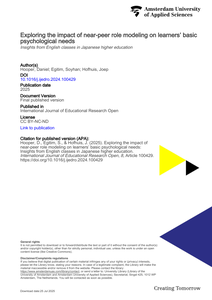Abstract The main purpose of this intervention was to measure student’s motivation in English Literature before and after an intervention based Zoltán Dörnyei’s Motivational Self System (2009) and Michael Magid’s (2011) application of the same theory in schools in Singapore. The present intervention was adapted to the students of the Dutch secondary school CLV (Christian Lyceum Veenendaal) in Veenendaal using fragments of English Literature (books, films, poems and songs). The intervention was carried out during eight lessons of fifty minutes where students had to participate in a variety of activities, all registered in a workbook assigned to each student at the beginning of the research project. Prior to and after the intervention, students filled in a questionnaire on motivation and English Literature. The results of these questionnaires were analysed with SPSS running descriptive statistical analysis. Along with these analyses, the timelines and life trees made by the students during the lessons and students’ answers given to the exercises on the workbooks were evaluated and compared. One of the most important conclusions of the intervention was that female students were more motivated, could make action plans and set goals easier and more detailed than male students. Another important result was that students in general had no interest in English Literature, although they realised it can be influential in their future life. The affective attitude of students to- wards the teacher and materials increased after the intervention, as well as students’ confidence in their own effort during class. However, the construct validity between the quantitative and qualitative data could not be established due to the fact that gender was not included as variable in the questionnaire. Gender relevancy became visible after the analyses of the workbooks. Therefore, future research will have to focus on including gender as a variable in the questionnaire in order to establish solid relations between quantitative and qualitative data. Another interesting research question for future interventions could be how to adapt English Literature and the materials that are being used in a way that both female and male students can tap into their own intrinsic motivational current.
DOCUMENT

English is increasingly the dominant language of academic scholarship. This means that much research produced in other languages is overlooked, a tendency strengthened by the growing power of global publishers and university ranking systems. This initial scoping study provides an exploratory review of non-English scholarship in the field of event management, drawing on an extensive literature search in Arabic, Croatian, Czech, Dutch, Italian, Portuguese, Slovenian and Spanish. We find a considerable number of event management publications in these languages, which effectively represent a ‘missing body of knowledge’ for scholars working in English. Only about 10% of these non-English sources are covered by Scopus, for example. Our scoping study indicates that this excludes many scholars and potentially interesting areas of work from the global event management corpus. We suggest several strategies which could be employed to address these issues.
DOCUMENT

Although near-peer role modeling (NPRM) has been suggested as an effective pedagogical intervention for boosting confidence, motivation, and self-efficacy, few studies have examined its connection with learner needs and well-being utilizing an established psychological framework. The present study investigates the pedagogical role of NPRM within English classes in Japanese higher education from the perspective of basic psychological need (BPN) satisfaction and frustration. In this two-phase explanatory mixed methods study, two quantitative scales were utilized to assess the significance of the connections between NPRM and six subcategories of BPN satisfaction or frustration. Subsequently, a qualitative investigation with a more limited sample size was conducted to elucidate and expand upon these associations. The quantitative findings revealed NPRM to be a significant predictor of students’ autonomy and relatedness satisfaction and exhibited a negative correlation with students' autonomy and relatedness frustration. However, no discernible association was observed between NPRM and competence satisfaction or frustration. The qualitative data revealed that the students’ mixed feelings of competence may have stemmed from low confidence and L2 self-concept with some students comparing themselves unfavorably to near-peer role models. The study highlights the need for NPRM interventions to be accompanied by instruction related to learner beliefs or growth mindsets.
DOCUMENT
